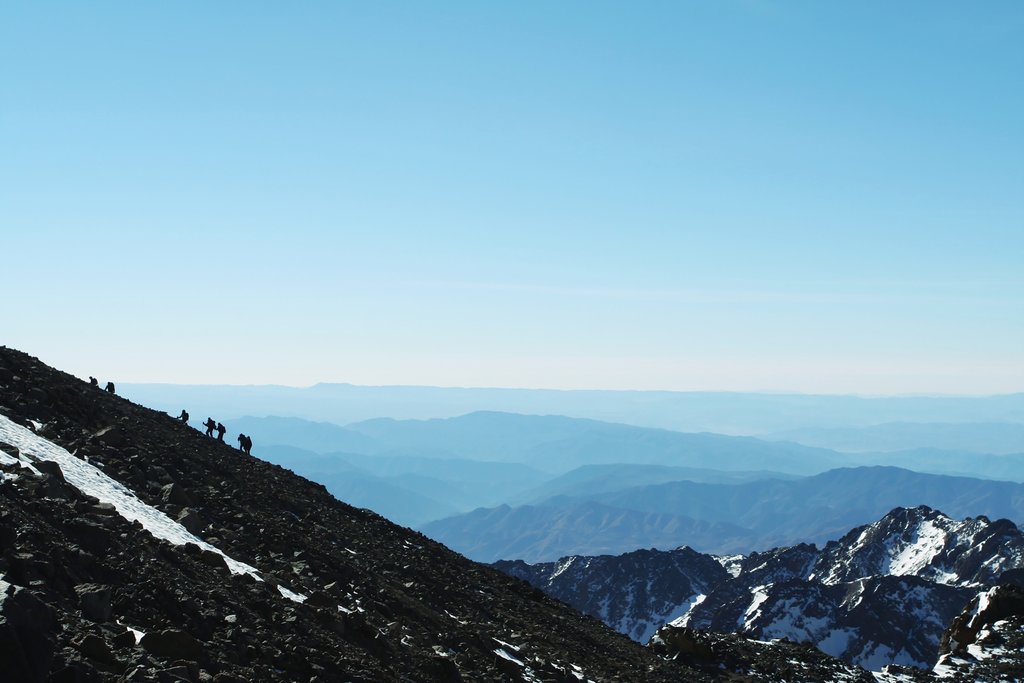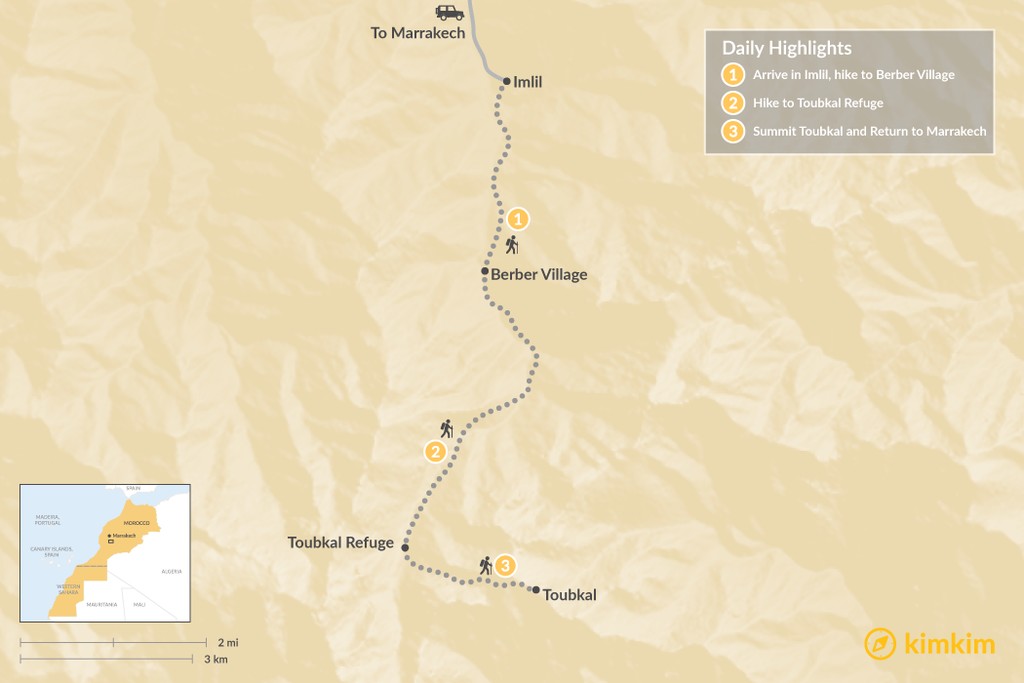
Hiking Morocco's Mount Toubkal

Overview

Just an hour and a half outside of bustling Marrakech, Toubkal is a popular attraction for visitors and locals alike. Set in the western part of the High Atlas, Toubkal is the highest peak in North Africa, overlooking the Haouz Plains to the north and the Siroua and Anti-Atlas Mountains to the south. You'll encounter snowy terrain from December to April, but the trails are open to trekkers year round.
Experienced hikers used to high altitudes can tackle the 13,671-foot (4,167m) peak in two days. However, reaching the summit of Toubkal is also incredibly accessible for the average joe (in good physical health) on a more relaxed trek of three days or more. As an added bonus, longer hikes include stops in Berber villages for an extra-memorable Moroccan experience.
Toubkal in 2 Days

Day 1: Imlil to Toubkal Refuge
In the morning you'll travel from Marrakech to the village of Imlil at an altitude of 5,709 feet (1,740 m), the starting point for your trek. From there you'll ascend up some steep passages and then down a wide path to the Imlil River. Continue on a narrow trail through the river valley to the Sidi Chamharouch shrine at the convergence of two rivers. Sidi Chamharouch is a popular place of pilgrimage, and makes a good place to stop for lunch. Then tackle some rough and rocky terrain to get to the Toubkal Mountain Refuge at 10,499 feet (3,200 m), where you'll end your first six-hour trek. Dig into a well-deserved dinner of traditional Berber fare and set up camp for the night.
Day 2: Toubkal Refuge to Summit and Return to Marrakech

You'll depart the refuge early in the morning after breakfast and tackle the most challenging part of the trek. The trail here is very steep, and you'll need crampons if hiking in the snowy winter months. After a three to four hour push to the summit at 13,671 feet, you'll enjoy fantastic 360-degree panoramic views of the surrounding mountains and plains. You'll have time to relax and take pictures before you begin your descent. Return to the refuge, then pass by Sidi Chamharouch on your way back to Imlil. A driver will bring you back to Marrakech after a total of nine hours of trekking.
Chat with a local specialist who can help organize your trip.
Toubkal in 3 Days

Day 1: Imlil to Berber Village
After arriving in Imlil, you'll begin a shorter, slower, 4 to 5-hour hike that will allow you to acclimate to the thinner air. You'll pass by several Berber villages and farms, and the striking Toubkal Kasbah hotel on the way. If you need a breather, stop in some of the villages and meet the locals. Berbers are famous for their warm hospitality, and may even welcome you into their home for tea. You'll spend the night in a Berber village in a gîte, or guesthouse. Here you'll enjoy a home cooked meal and a glimpse into their fascinating culture.
Day 2: Berber Village to Toubkal Refuge

Today you'll continue uphill for six hours towards the Toubkal Mountain Refuge, where you'll stay for the night. The terrain along this section of the trail is fairly steep, but once you pass Sidi Chamharouch, it's just two and a half hours away.
Day 3: Summit and Return to Marrakech

Get your game face on for the most challenging day of the trek! Set out on a steep three to four-hour hike to the summit, where you can celebrate your victory with a photo at the metal marker. After enjoying the spoils of your hard work, make your way back down to the refuge. You'll have time for a rest before you walk back to Imlil, where a driver will be waiting to drive you to Marrakech.
Tips
When hiking Toubkal, it's best to bring lots of layers to wear, including warm clothes and windproof jackets, at any time of year. While daytime temperatures in the summer are in the mid-70s Fahrenheit (25 degrees C), the nighttime is chilly, and temps drop further as you near the summit. Winter temperatures are below freezing on average, so come prepared!
A local Moroccan mountain guide will accompany you at all times, so no need to worry about getting lost. The guides also provide and prepare food and water for the duration of the hike. A mule (or a porter, if conditions are snowy) will carry your belongings up the mountain to make your experience as comfortable as possible.
Climbing Mt. Toubkal is a great experience on its own, or as part of a well-rounded tour of the country - check out some of Morocco's highlights here. There is so much to see in this North African gem, from bustling Marrakech to the Kasbah at Ait Benhaddou, Sahara Desert, and the beaches of Essaouira.
